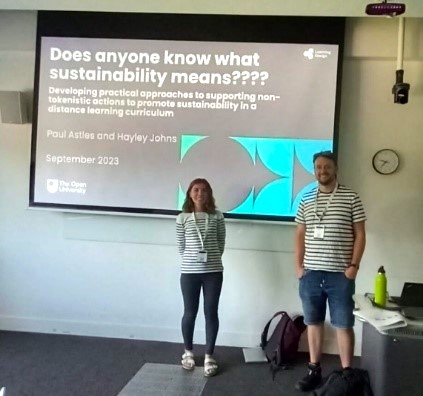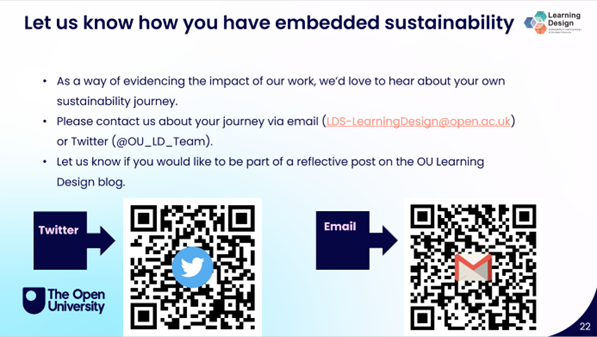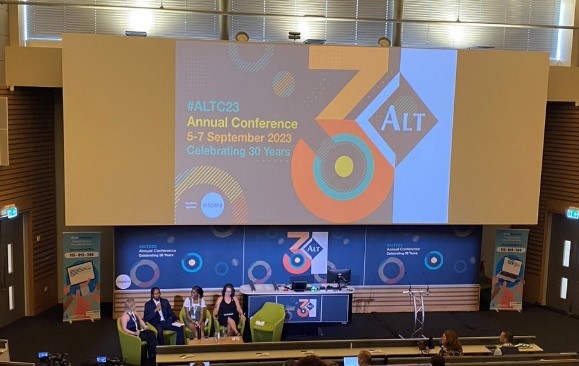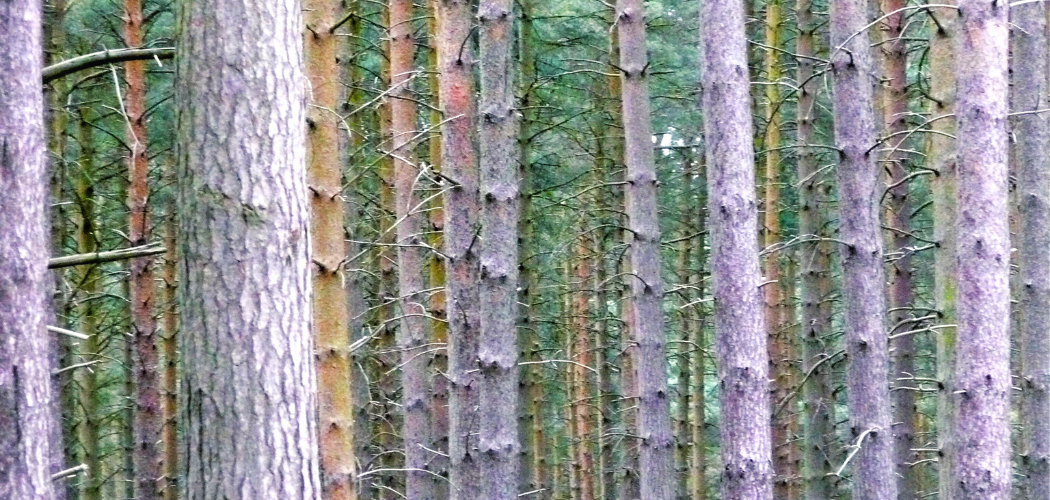Hayley Johns and Paul Astles ~ Learning Designers
This blog post builds on our previous sustainability related post. You can read that here. If you have not had a chance to read it yet, do go back and check it out.
The work presented by Hayley and Paul on behalf of the Learning Design Sustainability Group (LDSG) at #ALTC23 in Warwick is available by scanning the QR code (below) from one of the opening slides from our workshop presentation.
We delivered a 60-minute workshop designed in part to provide an update about the journey that the LDSG has taken so far and also to challenge delegates to consider how they could take meaningful practical steps to embed sustainability within their own specific design contexts.
The talk itself went well and, despite a fun fashion faux pas (you can see our gloriously coordinated outfits in the image below),  the content was received positively by delegates with many expressing a desire to take what they experienced in the session back to their own institutions and to use our resources to support their journey towards embedding sustainability.
the content was received positively by delegates with many expressing a desire to take what they experienced in the session back to their own institutions and to use our resources to support their journey towards embedding sustainability.
Indeed, this is something that we actively encourage. Therefore, we challenge you to do the same. Explore our resources, linked to in our slide deck, and consider how you could take action to embed sustainability within your context. Importantly, don’t forget to let us know how you get on.
As we outline in the slide included below, we are keen for you to be part of a reflective blog post detailing your experiences.

You can also read a case study of how one of our Learning Design colleagues used our resources to support a module team to embed sustainability in their module design.
Reflections on the ALT conference
The campus at Warwick is 710 acres. To put that into context, you can measure the length of one acre by laying 1,594 potatoes end to end. If you have never seen a potato, don’t worry, you could fit 696,960 regular square post-it notes within one acre also.
Why am I telling you this, I hear you ask? Well, it is because it helps to provide a context for why Hayley and I were quite unsure about where to park on campus. We eventually managed to find each other, though, don’t worry!!! As we got our bearings and made our way to the registration desk, we were excited (as well as a little bit warm given the heatwave) about what was ahead.
If you get a chance, please look at the posts we shared on the LD twitter account during the conference under the hashtag #ALTC23. This will give you a good insight into some of the key takeaways from the various sessions we had the pleasure of attending. What follows here are our own highlights and reflections from the conference experience across the event.
Paul’s reflections
Day 1 was an interesting mixture of nerves and excitement for me as our own conference workshop was immediately after lunch. There were some excellent sessions that I attended though. I found the theme of ‘hope’ in complex times to be an encouraging way to open the conference. An inspiring quote that I came away with was “nothing about us, without us” in a talk from the University of South Wales about their journey towards decolonising the curriculum. They shared some practical tips that they have learnt along the way in this resource.
A particular highlight of the conference for me was the explicit connection with student voice. At the conference this took several forms; one of which was a keynote panel discussion (see image below) that involved students sharing their experiences of higher education.

It was inspiring to see students talk with confidence about the support that they wish they had had during their studies. This partly centred around the digital shock experienced by all of them in the jump from secondary/further education to higher education. The expectations placed on them to ‘just know’ how to use various technology with a low level of support from their institutions should be a wake-up call and lesson to us all.
I love the language used in the JISC ‘Beyond Blended’ report. The ‘four modes of participation’ and ‘six pillars for designing’ help to provide a language to better understand how students may be experiencing their learning and how to support that. The only way that I can think to round off this reflection is with a Jurassic Park quote ‘Hold on to your butts’ (bonus points for tweeting us to tell us who said that). [Sidenote: If you follow Pedagodzilla on Twitter (aka ‘X‘) you may be interested to know that there’s a Jurassic Park themed episode on the horizon.]
Hayley’s reflections
This was the first in-person conference I’d been to since joining the OU’s Learning Design team, and what an introduction it was. As Paul mentioned, our session was just after lunch on the first day, which meant that we were then able to enjoy the rest of the conference without any nerves about how our own talk was going to go.
It was brilliant to meet people from so many different institutions, to connect with our own OU colleagues (Kathy Chandler from the Institute for Educational Technology (IET) attended our session), and to put faces to some well-known names from the EdTech community.
We also had the opportunity to meet ALT’s new CEO, Billy Smith, at a meet-and-greet session on Day 3. Paul and I had noticed that, despite sustainability being a conference theme, ours was the only session that explicitly covered the topic, and we were keen to find out more from Billy about how that could be resolved at future conferences. He agreed that it was important to come up with a suitable definition for sustainability in our sector, and that once it had been defined, it would continue to be a priority for ALT in the near future.
The experience of going to an in-person conference for the first time and all of the socialising that involves (not to mention the excellent gala dinner!) also made me reflect on what it’s like being an introvert in that kind of space. After our return, I posed a few questions on the subject to our fellow LDs, which were met with a really warm response and lots of thought-provoking replies.
Celebrating student voice
An integral part of our sustainability work has been to co-design a set of resources with our Curriculum Design Student Panel. These resources are a set of skills cards that split across three ‘packs’ (Pack 1, Pack 2, and Pack 3). The development of the cards was supported by student feedback, this feedback was an integral part of the design and development of the cards.
We wanted to take this opportunity to again thank and celebrate the student input as it helped to sense check and shape how the resources look today. If you are looking to embed sustainability skills within your context you may find it helpful to consider ‘crib sheet 4’. The crib sheets are a way of supporting colleagues to consider how to engage with our resources and we hope that they help you to feel supported to begin or continue your journey towards embedding sustainability in your context.
Key Takeaways from our Sustainability work so far
-
-
- Focus on identifying non-tokenistic actions that can meaningfully support change, knowledge building or skills development.
- Create opportunities for student input into resource design– their ideas, comments and critiques are invaluable.
- Recognise that everyone’s journey towards taking meaningful non-tokenistic actions to embed sustainability will be different.
-
What next?
The LDSG will be attending the Green Gown Awards as finalists in the ‘Sustainability Champion’ category. We’re looking forward to celebrating the work we have done to date – and hopefully coming away as winners of the award!
We’ll be taking stock as a group about the actions we need to take next, these are likely to include but not be limited to:
-
-
- Developing further support for colleagues to embed sustainability in their context.
- Connecting with colleagues to support the sector in what sustainability means in different contexts and how to meaningfully embed it across institutions.
-
A final question
We want to leave you with this question:
When considering sustainability in learning design, where are you at on your journey towards what non-tokenistic actions look like in your context?
If you’d like to talk with the Learning Design team at The Open University about any design support you’d find useful for your organisation, whether that’s running a session for you, helping you to use some of the resources we’ve shared via this blog, or simply for a bit of advice, please contact us at: [email protected]
Banner image: Shawndra Hayes-Budgen

